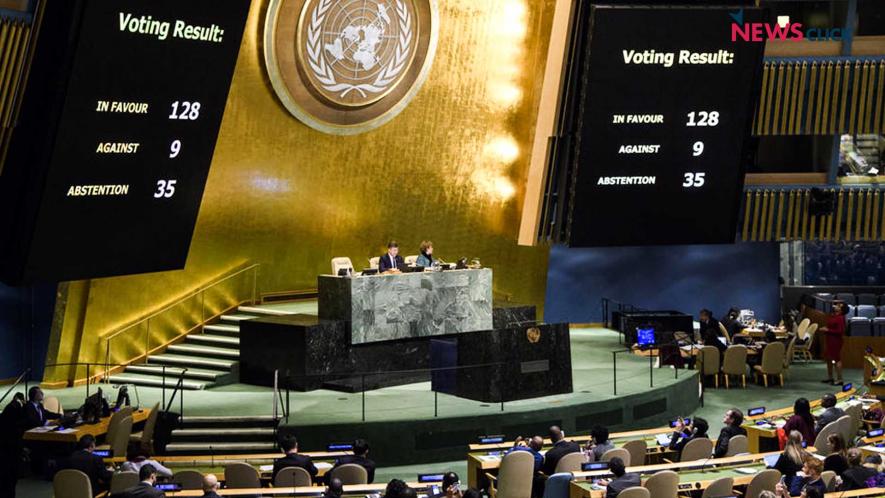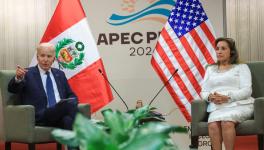Standing With Palestine is Standing With India’s Freedom Struggle Ethos

“Palestine belongs to the Arabs in the same sense that England belongs to the English or France to the French. It is wrong and inhuman to impose the Jews on the Arabs. What is going on in Palestine today cannot be justified by any moral code of conduct”, wrote MK Gandhi, India’s Father of the Nation, in 1938.
A decade later in May 1948, Israel is created on the Palestinian soil after the adoption of Resolution 181 (II) by the United Nations in November 1947 recommending Partition Plan for Palestine. At that time, India, who had just fought and won her independence stood with the people of Palestine voting against the 1947 resolution. India was first the non-Arab, non-Muslim country to recognise Palestine.
Seventy years later, amid the shifting foreign policy towards Israel, on December 21, India voted ‘silently’ in favour of UN General Assembly resolution criticising the US decision of recognising Jerusalem as Israel’s capital. Contrary to the expectations of India abstaining, the Indian UN delegate pressed the ‘In Favour’ button. Despite the threats and intimidations by US President Donald Trump, the Turkey and Yemen sponsored resolution was backed by 128 countries, with 35 abstentions and 9 voting against. Twenty-one countries did not participate in the vote. The resolution stated that the final status of the city of Jerusalem will be “resolved through negotiations in line with relevant United Nations resolutions.”
India’s Stand on Palestine: From A Proactive Friend to Silent Bystander
The apprehension among many in India is based on the fact that the government in India is forging a close friendship - diplomatically and ideologically - with Israel. Indian foreign policy in the context of Palestine under the Hindu conservative Modi government is witnessing a considerable moral erosion, as the leaders refuse to proactively stand behind Palestine. India, from her birth in 1947, had been proactively standing with Palestine and the cause of Palestinian people. The very ethos of India’s freedom struggle- the right to self-determination and anti-colonialism - had cemented her position on Palestine.
According to political experts, India’s vote in favour of the non-binding UN resolution is more to do with 'saving the face' from diplomatic embarrassment and maintaining the status quo, rather than firmly standing with Palestine. Under the international law, established by series of UN Security Council resolutions, Jerusalem has an international status- corpus separatum. Any support for the change of the status of Jerusalem - like Trump’s Jerusalem move - would have placed India on the wrong of international law. Furthermore, India going against the resolution would have dented the ‘champion of the Global South’ image.
In the UN General Assembly, India did not speak on the floor of the Assembly in New York. Rather, expressed th her Palestine position was independent and consistent- copy-pasting the same empty-rhetoric presented by the Indian foreign ministry spokesperson when Trump announced his decision to recognise Jerusalem as Israel’s capital. Many argue that this statement is just ‘beating around the bush’.
"It is not surprising that India will now not say anything against Israel as there is a very close bond being built between the two. The current Indian government's closeness to Israel is also owing to the very clear Islamophobia of both the regimes. That's very obvious. It's a coming together of Islamophobic regimes," notes Nivedita Menon, a professor at Jawaharlal Nehru University, about the increasing silence of India on the issue of Palestine.
The aberrations in India’s policy towards Palestine were seen even before the right wing BJP government came to power, but post-2014 a ‘paradigm shift’ is visible.
Vijay Prashad, professor of International Relations at Trinity College, says: “India’s road to Washington and arms lay through Israel. After India’s nuclear weapon tests in 1998, the US imposed economic and military sanctions. During the 1999 war with Pakistan, Israel supplied arms to India, which were American in any case. India under Indira Gandhi had already reached out to Israel in 1971 for arms despite absent diplomatic ties. The Palestine issue started getting sidelined long ago, while the Congress was in power.”
India voted in favour of 15 Palestine related resolution in UNGA in its current 72nd session, mostly as the resolutions are non-binding and were related to maintaining the status quo on the issues concerning Palestine. But despite these ‘in favour’ voting, India remained silent on crucial resolutions in UN, which could have been seen as firm solidarity with Palestine.
In 2015, India abstained from a vote at the UN human rights council that welcomed the U.N. Human Rights Council report, which found evidence of “alleged war crimes”. Interestingly, in July 2014, India voted against Israel and in support of a resolution instituting the very same inquiry report.
Earlier 2014, in the wake of Israeli massacre and bombing in Gaza, the Modi government was successful both in blocking a motion in Rajya Sabha, that suppressed the condemnation of Israel's killing of civilians, and in preventing the Lok Sabha from voting on Gaza.
India and Israel have been forging closer ties in multiple spheres- political, diplomatic, military, technology, and even ideological. In July this year, Indian Prime Minister Narendra Modi visited Israel - the first ever by an Indian prime minister to the Jewish state since the establishment of diplomatic relations 25 years ago. Modi had spoken about his personal affinity for Israel and his ‘friend’ Israeli PM Netanyahu. It was so personal that he decided to skip visiting the visiting Ramallah this year, the seat of the Palestine Authority and a customary stop for visiting leaders.
"Prime Minister Modi's visit to Israel is a dramatic signpost of how far India has shifted: from the support of the Palestinian struggle against occupation to total involvement and complicity with Brand Israel," Githa Hariharan, a supporter of BDS movement in India, told Al Jazeera.
An array of high-level visits to Israel by Home Minister Rajnath Singh, President Pranab Mukherjee and External Affairs Minister Sushma Swaraj has already been completed. In last one year, India has bought more than $10bn worth of arms from Israel, more than any other country.
Solidarity With Anti-Colonialism And Not Imperialism
The solidarity with the cause of Palestinian people is about justice, anti-colonialism and anti-apartheid, and any aberration to this, is an insult to the ethos of our own freedom struggle.
From the beginning, India had been a pioneer in support for anti-colonial liberation movements across the global. Back in 1952, India along with 12 other countries to proposed that the United Nations consider the problem of apartheid, which was leading to tension and conflict in South Africa and having international repercussions. India’s flourishing ‘strategic’ romance with Israel, the apartheid state, is contrary to the very ideals out of which India was born.
Contrary to what many ‘strategic expert’ thinks that India’s present ‘Israel drift’ is realpolitik, the move is clearly irrational, as it is based on ‘opportunistic alliance’ with states that are responsible imperialism and apartheid. And non-pragmatic, as India is still heavily dependent on Gulf countries for oil, and any move to change position on Palestine will jeopardise India’s energy security.
As MK Bhadrakumar, former Indian diplomat and foreign policy expert notes, “the Modi government should rethink its stance and show the moral courage and diplomatic and political sagacity to be on the right side of history. Above all, it is an act of solidarity by a nation, which has not fully forgotten yet the incredible saga of its own freedom struggle.”
Get the latest reports & analysis with people's perspective on Protests, movements & deep analytical videos, discussions of the current affairs in your Telegram app. Subscribe to NewsClick's Telegram channel & get Real-Time updates on stories, as they get published on our website.
























